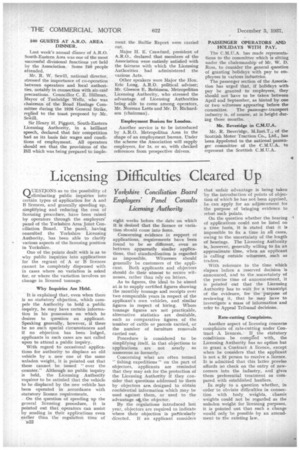Licensing Difficulties Cleared Up
Page 20

If you've noticed an error in this article please click here to report it so we can fix it.
Yorkshire Conciliation Board Employers' Panel Consults Licensing Authority
QUEST_TONS as to the possibility of eliminating public inquiries into certain types of application for A and B licences, and generally speeding up, simplifying and reducing the cost of licensing procedure; have been raised by operators through the employers' panel of the Yorkshire Area Joint Conciliation Board. The panel, having consulted, the Yorkshire Licensing Authority, has been able to clarify
• various aspects of the licensing position in Yorkshire.
One of the points dealt with is as to why public inquiries into applications for the regrant of A or B licences cannot be completely dispensed with in cases where no variation is asked for, or where the variation involves no change in licensed tonnage.
Why Inquiries Are Held.
• It is explainell that, even when thereis no statutory objection, which compels the Authority to hold a public inquiry, he may have certain information in his possession on which he desires to question an applicant. Speaking generally, however, if there be no such special circumstances and if no objection has been lodged, applicants in such cases are not called upon to attend a public inquiry.
With regard to occasional applications for authority to displace an oldvehicle by a new one of the same unladen weight, it is pointed out that these cannot be issued " over the counter." Although no public inquiry is held, the Licensing Authority requires to be satisfied that the vehicle. to be displaced by the new vehicle has been operated in accordance with statutory licence requirements. • .On. the question of speeding up. the general licensing procedure, . it is pointed out that ,operators can assist . by sending in their applications even earlier than the regulatioi-t time of n22
eight weeks before the date on which it is desired that thelicence or variation should come into force.
Concerning evidence in support rik applications, requirements have been found to be so different, even as
between apparently similar applications, that standardization is regarded
as impossible. Witnesses should generally be customers of the applicant. Both applicants and objectors should do their utmost to secure witnesses, rather than rely on letters.
As to figures, the ideal to be aimed at is to supply certified figures showing the monthly tonnage and receipts over two comparable years in respect of the applicant's own vehicles, and. similar figures in respect of hiring. Where tonnage figures are not practicable, alternative statistics are desirable, such as comparative figures of the number of cattle or parcels carried, or the number of furniture removals carried out.
Procedure is considered to be simplifying itself, in that objections to applications are not nearly so numerous as formerly.
Concerning what are often termed " fishing expeditions " on the part of objectors, applicants are reminded that they may ask for the protection of the Licensing Authority if they consider that questions addressed to them by objectors are designed to obtain confidential information which may be used against them, or used to the advantage Attie objector. •
By the regulations introduced last year, objectors are required to indicate where their objection is particularly directed. If an applicant considers that unfair advantage is being taken by the introduction of points of objection. of which he has not been apprised, he can apply for an adjournment for the purpose of bringing evidence to rebut such points.
On the question whether the hearing of applications -could not be listed on a time basis, it is stated that it is impossible to fix a time in all cases, owing to the uncertainty of the length of hearings. The Licensing Authority is, however, generally willing to fix an approximate time, when anapplicant is calling outside witnesses, such as traders.
With reference to the time which elapses before a reserved decision is announced, and to the uncertainty of the precise time of announcement, it is pointed out that the Licensing Authority has to wait for a transcript of the evidence, for the ':Purpose of reviewing it, that he may have to investigate a mass of information and refer to Appeal Tribunal decisions.
Rate-cutting Complaints.
Another aspect of licensing concerns complaints of rate-cutting under Contract A licences. If the statutory conditions be complied with, the Licensing Authority has no option but to grant a Contract A licence, except when he considers that the applicant is not a. fit person to receive a lieence. It is admitted that this latter proviso affords no check on the entry of newcomers into the industry, and gives them preferential treatment as com
pared with established hauliers. .
In. reply to a question whether, in. order to obviate difficulties in connection with body weights, chassis weights could not be regarded as the unladen weight for licensing purposes, it is pointed out that such a change would only be possible by an amendment to the existing law.


































